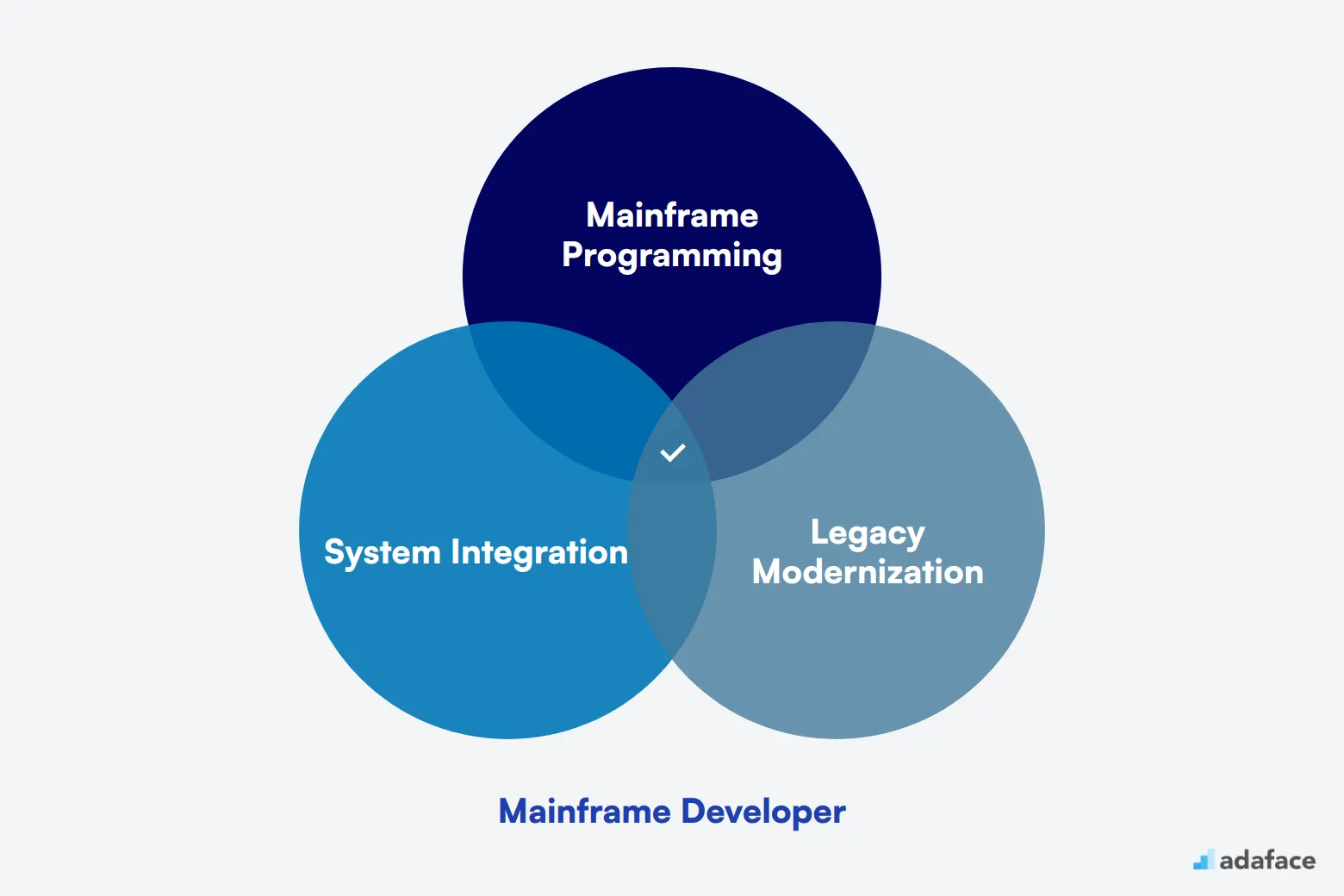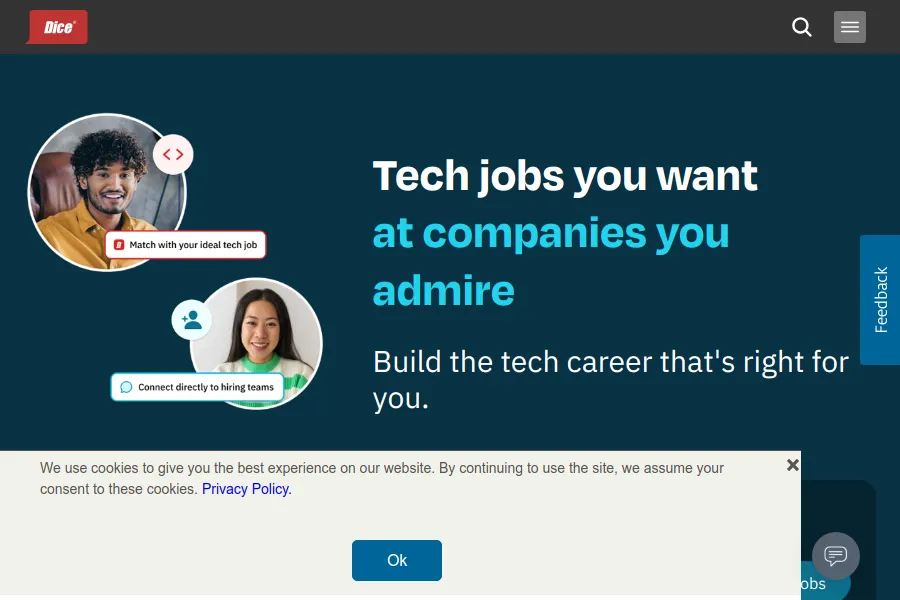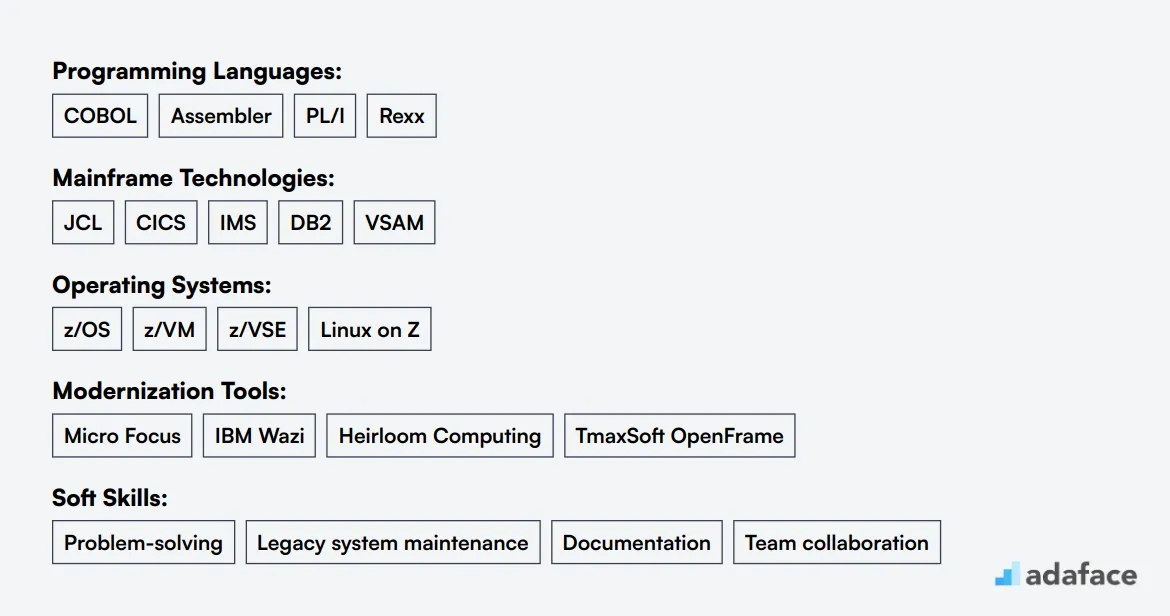In today's rapidly evolving tech landscape, mainframe systems remain the backbone of many large enterprises. Yet, finding a proficient mainframe developer can be challenging due to the niche set of skills required. Many companies struggle with identifying the right balance of technical prowess and experience to ensure that their mainframe operations run smoothly. This often results in mismatches between job requirements and candidate capabilities.
This article is designed to guide recruiters and hiring managers through the mainframe developer hiring process. We'll explore the roles and responsibilities of a mainframe developer, detail the skills and qualifications you should look for, and suggest strategies to efficiently screen resumes and conduct interviews. To further enhance your recruitment process, consider using our mainframe online test to assess candidates' skills before interviews.
Table of contents
Why Hire a Mainframe Developer?
Hiring a mainframe developer can be a strategic move for businesses still relying on legacy systems. These professionals are crucial for maintaining and updating critical applications that run on mainframe computers, which are often the backbone of large-scale data processing operations in industries like finance, healthcare, and government.
To determine if you need a mainframe developer, consider these factors:
- Your organization uses mainframe systems for core business operations
- You're planning to modernize legacy applications
- You need to integrate mainframe systems with newer technologies
If you're facing ongoing challenges with mainframe systems or planning significant updates, it's time to consider a full-time mainframe developer. For short-term projects or initial assessments, working with a consultant or taking an online assessment might be a good starting point.

What does a Mainframe Developer do?
A Mainframe Developer is responsible for developing and maintaining applications on large-scale computer systems, commonly known as mainframes. These professionals play a key role in ensuring that business-critical applications continue to operate smoothly and securely.
Mainframe Developers handle a variety of tasks to keep mainframe systems running effectively:
- Programming: They write and modify code using languages like COBOL, PL/I, and Assembler to create or update applications.
- System Analysis: Developers analyze existing systems to identify areas for improvement or necessary updates.
- Testing and Debugging: They test programs to ensure they function correctly and troubleshoot any issues that arise.
- Collaboration: Working closely with other IT professionals, Mainframe Developers collaborate to integrate systems and support business objectives.
- Maintenance: Regularly updating and maintaining the system is part of their job to ensure reliability and performance.
To learn more about the specific skills required for a Mainframe Developer, you can refer to our detailed skills guide.
Mainframe Developer Hiring Process
Hiring a mainframe developer involves a structured process that can take around 1-2 months. Each step is designed to ensure you find a candidate with the right skills and experience.
- Start with a clear job description: Draft a thorough job description and post it on relevant job boards. This is your first step in attracting qualified candidates.
- Resume screening: Expect to receive resumes within the first week. Screen them for essential skills and relevant experience.
- Skill testing: After shortlisting candidates, conduct skill assessments tailored to mainframe development. This might include coding tests or technical case studies, typically taking about a week.
- Interviews: Conduct interviews with the shortlisted candidates to assess their fit for your team. Focus on both technical skills and cultural fit.
- Offer stage: Finally, present an offer to the top candidate. Be prepared for negotiations, as good candidates may receive multiple offers.
Overall, the hiring process for a mainframe developer can be completed within 1-2 months, depending on your efficiency at each step. Let's explore each of these stages in detail and provide you with valuable resources to streamline your hiring journey.
Skills and qualifications to look for in a Mainframe Developer
Hiring the right Mainframe Developer can be challenging, especially when identifying the precise skills that align with your company's needs. It's common for recruiters to confuse what's essential versus what's merely preferred. Mainframe development is a specialized field, and the demands can vary significantly across organizations.
To clarify, here are the required and preferred skills and qualifications to guide your candidate profile:
- Required Skills and Qualifications:
- Bachelor's degree in Computer Science or related field
- 5+ years of experience in mainframe development
- Proficiency in COBOL programming
- Experience with JCL (Job Control Language)
- Knowledge of DB2 and mainframe databases
- Preferred Skills and Qualifications:
- Experience with CICS (Customer Information Control System)
- Familiarity with IMS (Information Management System)
- Knowledge of z/OS operating system
- Experience with Assembler language
- Understanding of mainframe modernization techniques
Understanding these distinctions will help you make informed decisions in your hiring process. For a more structured approach, consider utilizing skills assessment tools that can help evaluate candidates more effectively.
| Required skills and qualifications | Preferred skills and qualifications |
|---|---|
| Bachelor's degree in Computer Science or related field | Experience with CICS (Customer Information Control System) |
| 5+ years of experience in mainframe development | Familiarity with IMS (Information Management System) |
| Proficiency in COBOL programming | Knowledge of z/OS operating system |
| Experience with JCL (Job Control Language) | Experience with Assembler language |
| Knowledge of DB2 and mainframe databases | Understanding of mainframe modernization techniques |
Top Platforms to Hire Mainframe Developers
Now that you have a job description ready, it's time to list on job posting sites to source qualified candidates. Utilizing job listing platforms can help you connect with potential Mainframe Developers across various experience levels and industries.
Dice
Ideal for finding full-time Mainframe Developer positions across various industries. Dice specializes in tech jobs and attracts a wide range of employers.

Indeed
Suitable for all types of Mainframe Developer roles, including full-time, part-time, and contract positions. Indeed aggregates job listings from multiple sources.

LinkedIn Jobs
Excellent for leveraging professional networks to find and recruit Mainframe Developers. Allows direct communication with potential candidates.

Some of the best platforms to consider include Dice for tech-focused roles, Indeed for a broad range of job types, and LinkedIn Jobs for leveraging professional networks. These sites not only provide access to a large pool of candidates but also facilitate direct communication, making the hiring process smoother.
How to Screen Mainframe Developer Resumes
Screening resumes is the first step in finding the right Mainframe Developer for your team. Given the technical complexity and specific skill set required for this role, it's crucial to sift through resumes effectively to focus on the most qualified candidates.

When manually screening resumes, focus on key technical skills and experience. Look for mentions of programming languages like COBOL, job control with JCL, and database skills like DB2. Candidates mentioning experience with CICS and mainframe modernization tools such as Micro Focus are definitely worth a closer look.
AI tools like ChatGPT can streamline the screening process by identifying relevant keywords. These tools can save time by narrowing down resumes based on specified criteria, ensuring that you don't miss out on potential top talent. For those new to AI-assisted screening, the Adaface online assessment platform offers tools that can aid in this process.
Here's a handy prompt to use with AI tools:
TASK: Screen resumes to match job description for Mainframe Developer role
INPUT: Resumes
OUTPUT: For each resume, provide following information:
- Email id
- Name
- Matching keywords
- Score (out of 10 based on keywords matched)
- Recommendation (detailed recommendation of whether to shortlist this candidate or not)
- Shortlist (Yes, No or Maybe)
RULES:
- If you are unsure about a candidate's fit, put the candidate as Maybe instead of No
- Keep recommendation crisp and to the point.
KEYWORDS DATA:
- Mainframe Programming (COBOL, JCL, DB2)
- System Integration (CICS, IMS)
- Legacy Modernization (Micro Focus, Heirloom Computing)
Recommended Skills Tests for Assessing Mainframe Developers
Skills tests are an effective way to evaluate Mainframe Developer candidates beyond their resumes. They provide objective insights into a candidate's technical abilities and problem-solving skills. Here are the top tests we recommend for assessing Mainframe Developers:
Mainframe skills test: This Mainframe online test evaluates a candidate's proficiency in mainframe architecture, operating systems, and common mainframe technologies. It helps identify developers who understand the core concepts of mainframe computing.
COBOL programming test: COBOL remains a key language in mainframe environments. A COBOL online test assesses a candidate's ability to write, maintain, and debug COBOL programs, which is critical for many mainframe applications.
JCL (Job Control Language) test: JCL is used to instruct mainframe systems on how to run batch jobs. The JCL online test evaluates a candidate's ability to create and manage job streams, a fundamental skill for mainframe developers.
IBM DB2 test: Many mainframe systems use DB2 for data management. An IBM DB2 online test helps assess a candidate's knowledge of this database system, including SQL queries and database administration tasks.
Cognitive ability test: Beyond technical skills, mainframe developers need strong problem-solving abilities. A cognitive ability test can help evaluate a candidate's logical reasoning and analytical thinking skills, which are valuable in complex mainframe environments.
Case Study Assignments to Hire Mainframe Developers
Case study assignments can be effective for evaluating Mainframe Developers, but they come with drawbacks. These assignments often lead to low candidate completion rates and may result in losing qualified applicants due to their time-consuming nature. However, when used judiciously, they can provide valuable insights into a candidate's skills and problem-solving abilities.
Legacy System Modernization: This case study involves updating an outdated mainframe system to integrate with modern technologies. Candidates are tasked with proposing a migration strategy, considering factors like data integrity and system performance. This assignment tests their ability to bridge the gap between legacy systems and current software development practices.
Batch Processing Optimization: In this scenario, candidates are presented with a large-scale batch processing system that needs performance improvements. They must analyze the existing COBOL code, identify bottlenecks, and suggest optimizations. This case study assesses their proficiency in COBOL and their ability to enhance mainframe processing efficiency.
Disaster Recovery Planning: This assignment focuses on designing a disaster recovery plan for a critical mainframe environment. Candidates need to outline strategies for data backup, system redundancy, and failover procedures. It evaluates their understanding of mainframe architecture and their capacity to ensure business continuity in high-stakes scenarios.
Structuring the Interview Stage for Mainframe Developer Candidates
After candidates pass the initial skills tests, it's time for technical interviews to assess their hard skills in depth. While skills tests are great for initial screening, technical interviews help identify the best-fit candidates for the role. Let's look at some sample interview questions to evaluate mainframe developer candidates effectively.
Consider asking: 1) 'Explain the difference between CICS and IMS.' 2) 'How do you optimize COBOL code for better performance?' 3) 'Describe your experience with DB2 and SQL in a mainframe environment.' 4) 'What strategies do you use for debugging mainframe applications?' 5) 'How do you ensure data integrity in batch processing jobs?' These questions help assess the candidate's technical knowledge, problem-solving skills, and real-world experience with mainframe systems.
What's the difference between a Mainframe Developer and a Mainframe Systems Programmer?
Many people confuse the roles of Mainframe Developer and Mainframe Systems Programmer due to their overlapping environments. Both positions work within mainframe systems, but their focus and responsibilities differ significantly.
A Mainframe Developer typically holds a degree in Computer Science or IT and has 2-5 years of experience. Their primary responsibilities include developing and modifying applications using programming languages such as COBOL, JCL, and REXX. They focus on application-level systems, troubleshooting application bugs, and ensuring application security.
In contrast, a Mainframe Systems Programmer usually possesses 5-10 years of experience and also holds a degree in Computer Science or IT. They are responsible for installing and configuring the operating system and have a deep understanding of OS-level and hardware components. Their work includes troubleshooting system performance issues and deploying system software, with a focus on system security.
| Mainframe Developer | Mainframe Systems Programmer | |
|---|---|---|
| College Degree | Computer Science or IT | Computer Science or IT |
| Work Experience | 2-5 years | 5-10 years |
| Programming Languages | COBOL, JCL, REXX | Assembler, JCL, REXX |
| Work Responsibilities | Develop and modify applications | Install and configure the OS |
| System Knowledge | Application-level | OS-level and hardware |
| Troubleshooting | Application bugs | System and performance issues |
| Deployment | Application deployment | System software deployment |
| Security Focus | Application security | System security |
What are the ranks of Mainframe Developers?
Mainframe developers often progress through various career stages, each with increasing responsibilities and expertise. Understanding these ranks can help recruiters and hiring managers better assess candidates and their potential fit within an organization.
- Junior Mainframe Developer: This entry-level position is for those new to mainframe development. They typically work on basic coding tasks, bug fixes, and learn from more experienced team members.
- Mainframe Developer: At this level, developers have a few years of experience and can handle more complex projects independently. They're proficient in languages like COBOL and JCL, and understand mainframe architecture.
- Senior Mainframe Developer: These professionals have extensive experience and deep technical knowledge. They lead projects, mentor junior developers, and often specialize in specific areas of mainframe development.
- Lead Mainframe Developer: This role involves technical leadership and project management. Lead developers oversee large-scale projects, make architectural decisions, and often interact with stakeholders.
- Mainframe Architect: At the top of the technical ladder, architects design entire mainframe systems and strategies. They have a broad understanding of business needs and how mainframe solutions can address them.
When hiring for these positions, it's crucial to assess not just technical skills but also problem-solving abilities. Adaface's problem-solving interview questions can help evaluate candidates' critical thinking skills across all ranks.
Hire the Best Mainframe Developers for Your Team
In this blog post, we have explored the essentials of hiring a mainframe developer, from understanding their role, identifying the right skills and qualifications, to navigating the hiring process. We've also discussed the importance of thorough resume screening and interview structuring to find the ideal candidate.
The key takeaway is that crafting precise job descriptions and utilizing skill-specific tests can make the hiring process more accurate and effective. Consider using assessments like the Mainframe Online Test or the COBOL Online Test to evaluate candidates' expertise. These steps will ensure you bring onboard a mainframe developer who truly aligns with your team's needs.
IBM Mainframe Online Test
FAQs
Look for skills such as proficiency in COBOL, JCL, and IBM DB2, along with problem-solving abilities and experience with mainframe systems.
Top platforms for hiring mainframe developers include job boards, online freelance platforms, and professional networking sites.
A mainframe developer focuses on writing and maintaining application code, while a mainframe systems programmer is responsible for system-level tasks such as maintenance and support.
You can assess technical skills through coding tests and case study assignments tailored to mainframe technologies.
A mainframe developer's resume should include their technical skills, relevant experience, and specific projects they have worked on.
Structure the interview by including technical assessments, problem-solving exercises, and behavioral questions to evaluate both technical and soft skills.
Mainframe developers can be categorized into junior, mid-level, and senior roles, with increasing responsibilities and expertise required at each level.

40 min skill tests.
No trick questions.
Accurate shortlisting.
We make it easy for you to find the best candidates in your pipeline with a 40 min skills test.
Try for freeRelated posts
Free resources



